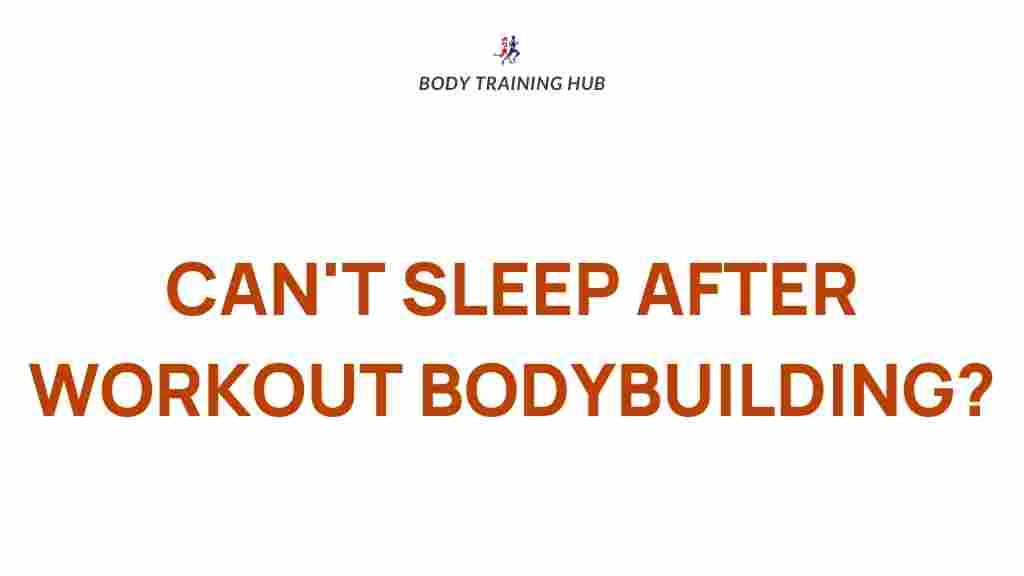Uncovering the Science Behind Post-Workout Insomnia
For many fitness enthusiasts, achieving the perfect workout is just part of the equation. After an intense session of bodybuilding or exercise, one would expect to fall into a deep, restful sleep that aids in recovery. However, post-workout insomnia is a common issue that can hinder muscle recovery, performance, and overall health. This article dives into the science behind this phenomenon, exploring how workouts affect sleep and providing strategies for minimizing insomnia.
The Connection Between Workout and Sleep
Understanding the relationship between workout intensity and sleep is crucial for anyone engaged in fitness. Exercise is generally known to improve sleep quality, but certain factors can lead to post-workout insomnia. Here’s how exercise impacts your sleep:
- Exercise Timing: Working out too close to bedtime can elevate heart rate and body temperature, making it harder to fall asleep.
- Cortisol Levels: Intense workouts can increase cortisol, a stress hormone that may interfere with sleep.
- Muscle Recovery: Bodybuilders and fitness enthusiasts need adequate rest for muscle recovery, which is hindered by lack of sleep.
How Exercise Affects Sleep Patterns
When you engage in exercise, your body undergoes several changes that can influence sleep patterns:
- Increased Body Temperature: Post-exercise, your body temperature remains elevated, which can delay sleep onset.
- Endorphin Release: While endorphins can promote a sense of well-being, they might also keep you alert.
- Energy Levels: After an intense workout, you may feel energized rather than tired, disrupting your natural sleep cycle.
The Science of Recovery and Sleep
Recovery is an integral part of any fitness routine, especially in bodybuilding. Sleep plays a key role in recovery due to the following reasons:
- Muscle Repair: During deep sleep, the body releases growth hormones that repair and build muscle tissues.
- Energy Restoration: Sleep helps replenish glycogen stores, crucial for performance in subsequent workouts.
- Cognitive Function: Adequate sleep improves mental focus and decision-making, essential for successful workouts.
Step-by-Step Process to Improve Sleep Post-Workout
If you find yourself struggling with insomnia after workouts, here are some actionable steps to enhance your sleep quality:
1. Optimize Your Workout Schedule
Try to finish your workout session at least 3 hours before bedtime. This allows your body temperature and heart rate to return to normal, promoting better sleep.
2. Cool Down Properly
Incorporate a proper cooldown routine after your workouts. This can include:
- Gentle stretching to relax muscles.
- Deep breathing exercises to lower heart rate.
3. Monitor Your Nutrition
What you eat can significantly impact your sleep quality. Consider the following:
- Post-Workout Nutrition: Consume a balanced meal with proteins and carbohydrates after your workout to aid recovery.
- Avoid Stimulants: Limit caffeine and nicotine intake, especially in the hours leading up to sleep.
- Hydration: Stay hydrated, but avoid excessive fluids right before bedtime to minimize nighttime awakenings.
4. Create a Sleep-Conducive Environment
Your sleep environment can greatly affect your ability to rest. Here are some tips:
- Darkness: Use blackout curtains to keep your room dark.
- Temperature Control: Maintain a cool room temperature for optimal sleep.
- Noise Reduction: Use earplugs or a white noise machine to minimize disturbances.
5. Incorporate Relaxation Techniques
Before bed, engage in relaxation practices such as:
- Meditation to calm your mind.
- Gentle yoga to release muscle tension.
- Reading a book or listening to calming music.
6. Be Consistent with Your Sleep Schedule
Try to go to bed and wake up at the same time every day. This consistency helps regulate your body’s internal clock, leading to improved sleep quality.
Troubleshooting Tips for Post-Workout Insomnia
If you’ve tried the above steps and still experience insomnia, consider these troubleshooting tips:
1. Evaluate Your Workout Intensity
High-intensity workouts are great for performance but can lead to sleep disturbances. Consider moderating your workout intensity, especially before sleep.
2. Assess Your Stress Levels
High stress can exacerbate insomnia. Incorporate stress management techniques such as mindfulness or journaling to help ease your mind.
3. Consult a Professional
If insomnia persists, consulting a healthcare professional or a sleep specialist can provide personalized advice and potential treatment options.
4. Use Sleep Aids Wisely
While some may turn to sleep aids, it’s essential to use them under medical guidance. Natural supplements like melatonin can be beneficial, but should not be a long-term solution.
Conclusion
Post-workout insomnia can be a frustrating barrier to achieving optimal recovery and performance in fitness. By understanding the science behind how workouts affect sleep, you can take proactive steps to ensure you get the rest your body needs. From adjusting workout schedules to incorporating relaxation techniques, these strategies can help you improve your sleep quality significantly.
Remember, a good night’s rest is just as important as the workout itself for muscle recovery and overall fitness success. For further reading on sleep and recovery in fitness, check out this resource. With the right approach, you can conquer insomnia and make the most out of your bodybuilding journey.
This article is in the category Strength & Recovery and created by BodyTraining Team
